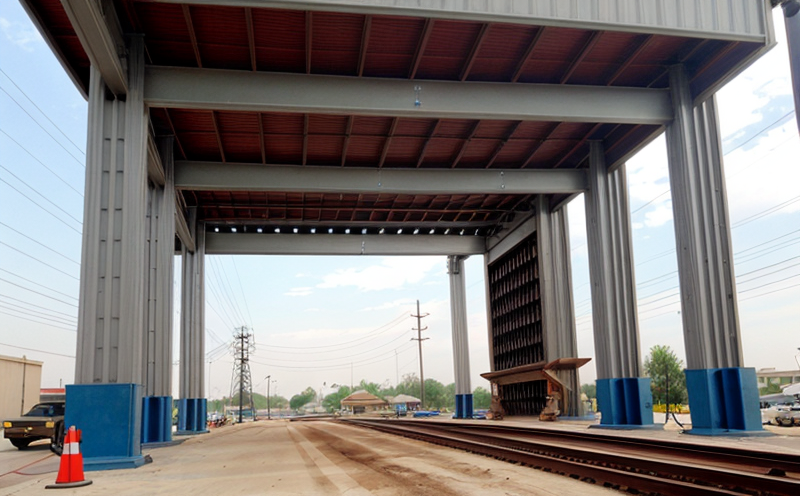ASTM E8 Tensile Testing of Aerospace Metals
The ASTM E8 tensile test is a cornerstone in the evaluation and certification of aerospace metals, ensuring that materials used in critical components meet stringent performance requirements. This test is particularly important for structural integrity and mechanical reliability under high-stress conditions.
Aerospace engineering demands precision and reliability, given the critical nature of the components involved. The ASTM E8 standard specifies a method for determining tensile properties of metallic materials by subjecting them to gradually increasing tension until failure occurs. This testing is essential in aerospace applications where even minor flaws can have catastrophic consequences.
The process involves several key steps: preparation, specimen selection, and execution of the test. Specimens are typically cut from larger pieces of metal or alloy samples using precision cutting techniques that minimize stress concentrations. The specimens must be free from defects such as cracks, inclusions, or uneven surfaces to ensure accurate results.
Once prepared, the specimens undergo a tensile test on specialized hydraulic testing machines capable of applying controlled loads. The machine records deformation and load data which are then used to calculate various mechanical properties including yield strength, ultimate tensile strength (UTS), elongation at break, and reduction in area. These metrics provide comprehensive insights into the material's behavior under stress.
The ASTM E8 standard also emphasizes the importance of accurate specimen preparation as even small discrepancies can lead to erroneous results. Thus, strict adherence to sample preparation procedures is crucial for reliable outcomes. The testing process itself requires a controlled environment to prevent external factors from influencing the results.
Understanding the implications of these tests is vital for quality managers and compliance officers responsible for ensuring product integrity. For R&D engineers, this test provides critical data that can influence material selection and design optimization. Meanwhile, procurement teams rely on accurate tensile testing reports to verify supplier compliance with aerospace industry standards.
- Customer Impact: Accurate tensile testing ensures safer aircraft structures by verifying the mechanical properties of materials used in various components like engine parts, fuselage sections, and landing gear. Reliable results enhance confidence in material performance under extreme conditions.
In summary, ASTM E8 tensile testing is an indispensable tool for aerospace engineers aiming to meet rigorous quality standards while ensuring product safety and reliability. Its significance cannot be overstated as it directly impacts the trustworthiness of materials used in critical applications within this sector.
Scope and Methodology
The ASTM E8 tensile test method is widely recognized for its ability to evaluate the mechanical properties of metallic materials, making it a vital tool for aerospace quality assurance. The scope of this testing includes determining key mechanical characteristics such as yield strength, ultimate tensile strength (UTS), elongation, and reduction in area.
The methodology involves preparing specimens from raw material or semi-finished parts according to specified dimensions and tolerances. Specimens are then mounted onto grips within the test fixture before being subjected to a controlled load until failure occurs. Throughout this process, data is captured through strain gauges attached to the specimen, providing real-time measurements of deformation.
For aerospace applications specifically, the ASTM E8 standard ensures that materials used in high-stress environments can withstand expected operational demands without compromising safety or performance. This includes metals like aluminum alloys, titanium, and stainless steel which are commonly employed in various aircraft parts including wings, engines, and landing gear.
The methodology also considers environmental conditions during testing to simulate real-world scenarios more accurately. Temperature control chambers allow for tests under different ambient temperatures, while humidity levels can be adjusted to account for varying atmospheric conditions. Such controlled environments ensure that the results reflect realistic performance in actual usage.
Quality and Reliability Assurance
Ensuring quality and reliability is paramount when conducting ASTM E8 tensile tests for aerospace metals. This involves a comprehensive approach encompassing meticulous specimen preparation, precise instrumentation calibration, stringent procedural adherence, and rigorous data analysis.
Meticulous specimen preparation ensures that only defect-free samples are tested, minimizing variables that could skew results. Specimens must be cut from larger billets or plates using precision saws to maintain uniform dimensions and minimize stress concentrations around the sample area. This step is critical as even slight deviations can affect the accuracy of mechanical property values.
Calibration of testing equipment guarantees consistent and accurate measurements across all tests conducted. Regular calibration checks are performed by trained technicians who use traceable reference standards provided by recognized organizations like NIST or ISO. Proper alignment of grips, calibration of load cells, and verification of strain gauge readings ensure reliable data collection throughout the test.
Strict adherence to established procedures minimizes human error while maintaining high-quality testing practices. Each step from sample preparation through execution is documented meticulously to trace any potential issues back to their source if discrepancies arise post-test. Standard operating procedures (SOPs) are developed and followed rigorously, ensuring consistency in methodology across all tests performed.
Data analysis plays a crucial role in verifying the integrity of test results before reporting them. Statistical methods like standard deviation calculations help identify outliers or anomalies that might indicate errors during testing. Inter-laboratory comparisons ensure consistency between different facilities conducting similar tests on identical materials, further enhancing confidence in reported values.
Customer Impact and Satisfaction
- Enhanced Safety: Accurate tensile testing ensures that aerospace components meet stringent safety standards, reducing the risk of failures during flight.
- Increased Confidence: Reliable test results provide stakeholders with greater assurance regarding material performance under extreme conditions.
- Improved Efficiency: By identifying suitable materials upfront through thorough testing, manufacturers can streamline their production processes and reduce development timelines.
- Better Design Optimization: Detailed mechanical property data obtained from tensile tests allows engineers to optimize designs for weight reduction without compromising structural integrity.
In conclusion, ASTM E8 tensile testing significantly contributes to the overall safety and reliability of aerospace products by providing precise and consistent evaluation of metallic materials. This translates directly into enhanced customer satisfaction through safer air travel experiences and reduced incidents involving material-related issues.





